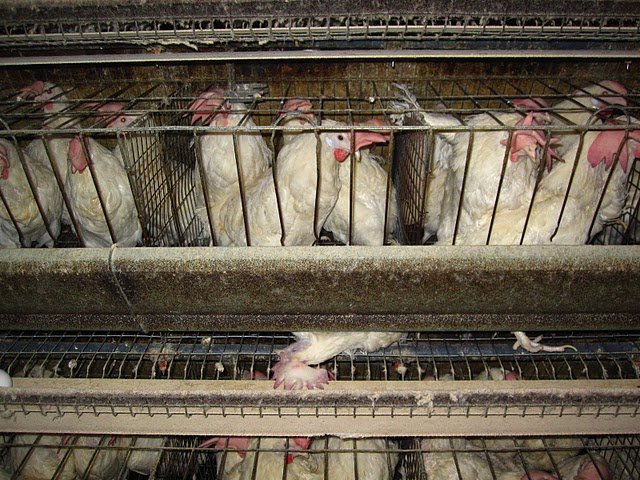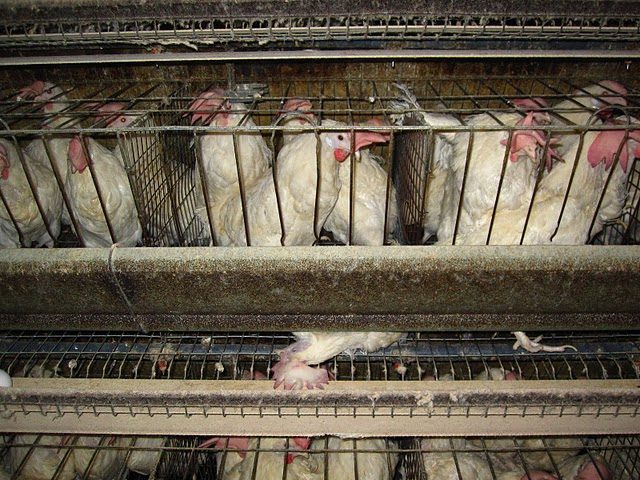It’s been more than a year since I first wrote here about a proposed farm animal protection ballot measure in Massachusetts that would prohibit the sale of eggs, pork and veal from animals raised in extreme, inhumane confinement. Since that blog, thousands of Massachusetts residents have circulated and signed petitions – about 170,000 in all – to qualify the measure for the November ballot as Question 3. After a failed attempt in recent months by the agribusiness lobby to knock us off the ballot through litigation, our coalition has swelled, and we’ve made remarkable strides toward ensuring a victory for chickens, pigs, and cows. But much work remains, and we hope you’ll support Question 3 in whatever way makes sense for you.
HSUS staff, along with allies from the MSPCA, ASPCA, and The Humane League, have been reporting great turnout and enormous enthusiasm at grassroots organizing events throughout the state this past week. They’ve met volunteers brand new to animal activism, as well as veterans of past ballot measures in Massachusetts to ban greyhound racing or cruel traps and other regressive wildlife killing practices.

Who wouldn’t be disgusted to know that most hens used for eggs are confined in cages too small to even extend their wings? Photo by The HSUS
Complementing the hard work of these advocates, volunteers outside the state are helping out by making calls to Massachusetts voters. Veteran advocates might remember the old days of phone banking, when you’d have to dial hundreds of numbers by hand. New technology makes our system easy to use, automatically dialing numbers for you and maximizing the benefits of every volunteer hour. You don’t have to be an expert to make calls; all you need is a phone, a computer, and a passion for animal protection, and you can do it from anywhere, in any state. It’s easy, just sign up here to start.
We’ve seen time and time again that once voters learn the truth about factory farming, they’re ready to embrace a new vision for agriculture. After all, who wouldn’t be disgusted to know that veal calves and breeding pigs are often locked for months in crates too narrow to turn around, and that most hens used for eggs are confined in cages too small to even extend their wings? Massachusetts voters typically come away from these conversations indignant about this kind of animal treatment and vow to vote YES on Question 3. But in every election, some voters don’t take the time to evaluate or to vote on ballot questions, while others could be fooled by misinformation from agribusiness interests who stoke fear and provide false assurances about their treatment of animals. That’s why it’s critical that we reach as many voters as possible before they step into the voting booth to remind them that voting YES! on Question 3 will prevent animal cruelty.
While having one-on-one conversations with voters is crucial in turning out the YES! vote, we’re planning on running a multi-faceted campaign to persuade voters. Donations, big and small, are needed to ensure that that the campaign will be able to run television advertising, exposing voters to the horrors of cage confinement. We’ve garnered more than 1,000 endorsements from family farmers, veterinarians, businesses, and non-profits. Campaign staff and coalition partners are communicating with reporters and editors at newspapers from Boston to the Berkshires about the benefits this measure would have for food safety, the environment, and animals. And there’s much, much more.
Before we launched our campaign, there were just a handful of food retailers that pledged to stop purchasing eggs from hens confined in cages. Since we filed the measure, the trickle has turned into a gusher. Walmart, Costco, McDonald’s, Dunkin’ Donuts, Starbucks, and about 200 other big brand names have now pledged to phase in cage-free eggs exclusively. This movement of 90 percent of the food retail sectors in our direction – most of those same companies have made the same pledge on pigs and gestation crate confinement – demonstrates that our ideas are solidly in the mainstream and practical from a food procurement and sale perspective. In short, Question 3 is an affirmation of what many of the biggest low-cost food sellers have already decided to do.
Yet, like laws against dogfighting or animal cruelty, we need a law to bring around the outliers and to set a bright-line standard in the law that certain conduct toward animals is not a choice or a preference, but a core human responsibility. Even if 10 percent of eggs or pork sold come from cage-confinement operations, that means millions of animals are enduring endless privation. Massachusetts voters have the opportunity to make clear that animal products produced and sold within the state must meet a minimum standard. No animal should be kept in a cage for her whole life and essentially immobilized. That’s cruel, and the enactment of Question 3 will remind every retailer that doing business in Massachusetts requires them to refrain from participating in such cruelty.
Question 3 not only prevents the cruelest confinement of veal calves, breeding sows, and laying hens, but it also prevents food retailers from selling animal products within the state that come from factory farms anywhere that lock their animals in cages. By passing it, Massachusetts voters will put an exclamation point on our campaign against a system that was never acceptable and that should never have become routine.
The post Massachusetts voters can clinch the case against farm animal confinement appeared first on A Humane Nation.
Enviroshop is maintained by dedicated NetSys Interactive Inc. owners & employees who generously contribute their time to maintenance & editing, web design, custom programming, & website hosting for Enviroshop.
